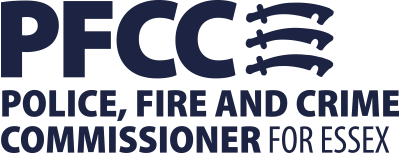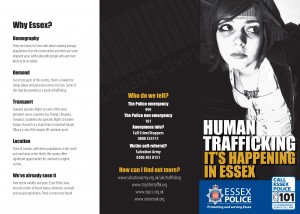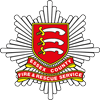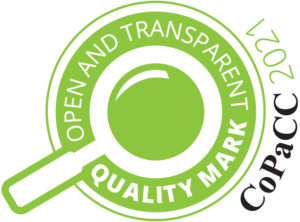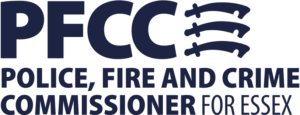Shining a light on human trafficking and modern slavery
In December I wrote about modern slavery and my concerns that, as with other forms of ‘hidden harm’, it is happening in Essex. The article followed the announcement of the government’s Modern Slavery Bill and I spoke of my intent to explore the impact and scale of human trafficking in Essex.
In the ensuing months I know that officers in Essex Police have been working with partners and charitable organisations to take things forward; with a focus on raising frontline awareness and making sure that internal procedures prepare organisations to deal with any increase in reports. Whilst this might not sound particularly dynamic, such a foundation is critical to future success. I want to make sure that professionals and volunteers working with potential victims of modern slavery, also known as human trafficking, know what to look out for and who to tell. It is equally important that the agencies charged with looking after victims and bringing offenders to justice know how to deal with the information they receive.
In the last few weeks the National Crime Agency issued the figures for the United Kingdom for 2013, giving high-level data about the victims that were identified and referred last year. They showed that referrals increased by 47% compared with 2012, with children making up a quarter of all referrals. Sexual exploitation and forced labour were the most prevalent types of trafficking and whilst Eastern European countries, Nigeria and Vietnam remained the most frequent countries of origin for victims, UK citizens featured as the 5th most trafficked nationality.
As we turn over the stone on modern slavery we are finding that the problem exists far closer to home than we’d ever imagined. It is clear that this is criminal business as usual in Britain.
I know that there are five slavery-related investigations being worked on by Essex Police at this time. I am also aware that in the last 3 months the force has received and acted upon several other pieces of intelligence concerning potential victims. I can’t talk about these cases in detail because they are on-going, but they concern people subjected to degrading and inhumane treatment and I am pleased that the force is taking them seriously.
On Friday 7th March I was delighted to be invited to open an event at South Essex College, arranged by the Southend, Essex and Thurrock safeguarding boards and facilitated by Essex Police. The event, organised by DCI Simon Anslow who is the force lead on tackling modern slavery, had a real buzz about it with more than 100 people from a wide range of organisations, charities and community groups represented.
We were treated to an excellent presentation from Heather Knight, national coordinator of the international charity, Stop the Traffik. Heather opened many eyes to the reality of modern slavery and I could tell that it struck a chord with those in the room who have seen exploitative situations, but not known they fell under the banner of human trafficking. Some lively debate in the table session after the talk led to more than 40 different suggestions as to how we can better tackle the problem, focussing on partnership working, training professionals, raising public awareness and reducing the demand for products and services over which people are exploited.
It was wonderful to see such interest from the very people who can make a difference to the lives of any victims in Essex, but we can’t stop at a good one-off event and some useful ideas, this has to translate into genuine activity. I will continue to ask for updates on the progress that is being made and this year will make specific mention of human trafficking and other ‘hidden harms’ in my refreshed Police and Crime Plan.
In the meantime, I implore everyone to take even just a little time to learn a bit more about modern slavery and crucially to report any concerns to the police or their local authority. The more eyes and ears we have, the more people we can save.
Nick Alston, Police and Crime Commissioner for Essex

